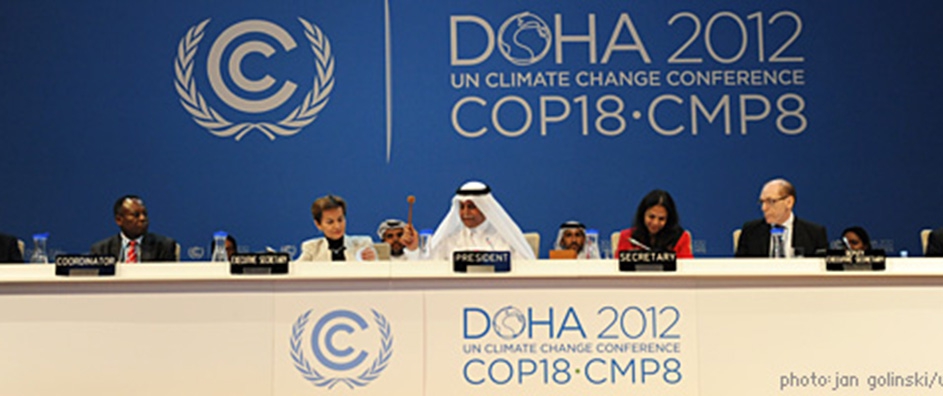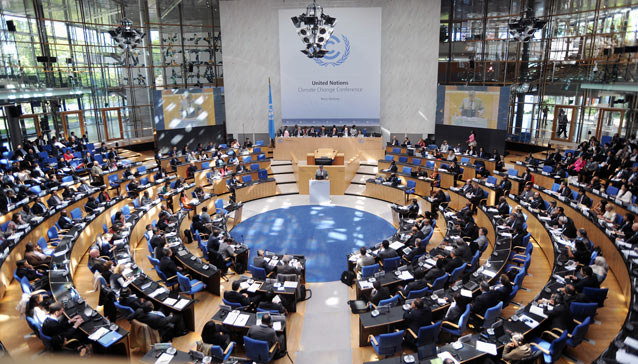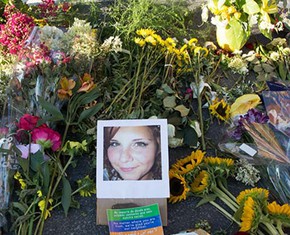The views expressed in our content reflect individual perspectives and do not represent the authoritative views of the Baha'i Faith.
So far, the community of nations hasn’t acted much like a community when it comes to climate change.
Starting more than a quarter century ago in 1988, politicians and scientists at the World Conference on the Changing Atmosphere in Toronto concluded that “humanity is conducting an unintended, uncontrolled, globally pervasive experiment whose ultimate consequences could be second only to a global nuclear war.”
That conference recommended a twenty percent reduction in carbon dioxide emissions by 2005.
Four years later, at the Rio Earth Summit in 1992, 154 nations signed the United Nations Framework Convention on Climate Change – and the UNFCCC became the world’s primary treaty mechanism for tackling global warming. The signatories agreed to stabilize “greenhouse gas concentrations in the atmosphere at a level that would prevent dangerous interference with the climate system.” The world’s wealthiest developed countries accepted responsibility for the overwhelming majority of emissions, and agreed to “aim to stabilize” those emissions at 1990 levels by the year 2000.
Five years after that, more than 150 countries signed the Kyoto Protocol in December of 1997, which binds 38 of the world’s wealthiest industrialized countries to reduce greenhouse gas emissions by an average of 5.2% below 1990 levels. The United States, responsible for more than a third of the world’s carbon emissions, signs the Kyoto Protocols but refuses to ratify them.
Then, three years later in November of 2000, climate negotiations between nations at The Hague collapse. Many major industrialized countries try to exploit loopholes in the Kyoto Agreement’s “flexibility” mechanisms.
Five years later, in 2005, the Kyoto Protocol becomes international law when Russia ratifies the agreement. The United States continues to refuse to ratify it. Pressure mounts for a second round of negotiations on the Kyoto Protocols when scientists report that greenhouse gases continue to rise.
Subsequently, the world’s major industrialized countries, the G8, agree to a limit of 2 degrees Celsius of average global warming. To reach this goal, the G8 nations agree that global greenhouse gas emissions must be reduced by at least 50% by 2050, and emissions from developed countries should be reduced by 80% or more.
At the Copenhagen UN Climate Change Conference in 2009 and the Doha Conference in 2012, negotiations resulted in the extension of the Kyoto Protocols until 2020. However, scientists reported that the Kyoto accords only apply to approximately 15% of annual global emissions of greenhouse gases, drastically insufficient to control climate change.
To sum it up, although the world’s nations have negotiated on the serious climate crisis we all face for more than twenty-five years now, none of the original or subsequent goals have ever been met. In fact, we haven’t even come close. The world, so far, has failed spectacularly in its voluntary efforts to curb climate change or the emissions that cause it.
This lack of progress puts us all in serious danger. More importantly, it puts our children and their children in worse danger. If we fail, they will inherit a severely compromised world.
Continuing the multilateral, consensus-driven model of climate negotiations — where each nation can opt out of the process, or block overall progress, or fail to meet its emissions goals without any consequences — endangers humanity’s entire future. If we continue to fail now as we have previously, we will leave our children and grandchildren a carbon-laden atmosphere, a planet with out of control warming, and a world with deeply diminished prospects for prosperity and peace.
Why is this so hard? Because the whole world knows that climate change goes far beyond a simple environmental issue. Because it implicates and involves every aspect of every national economy, climate change challenges the standard, unlimited growth expectations most models of economic development predict. Because slowing climate change requires long-term thinking and planning, rather than the near-sighted focus on immediate, short-term gains baked in to our current financial and social structures. Because climate change — and the curbs on the pollution from industrial production its mitigation implies — threatens the entire ethic of consumerism and materialism itself.
As a result of all those significant challenges, some nations have begun to conclude that the consensus-driven, multilateral climate negotiation model must be replaced with a majority vote model. In other words, only the whole world can make the decisions the whole world requires.
The Baha’i teachings came to that conclusion long ago:
…there must needs be established the parliament of man or court of last appeals for international questions. The members of this arbitral court of justice will be representatives of all the nations. In each nation the members must be ratified by the government and the king or ruler, and this international parliament will be under the protection of the world of humanity. In it all international difficulties will be settled. – Baha’u’llah, Baha’i Scriptures, p. 278.

















Comments
Sign in or create an account
Continue with Googleor